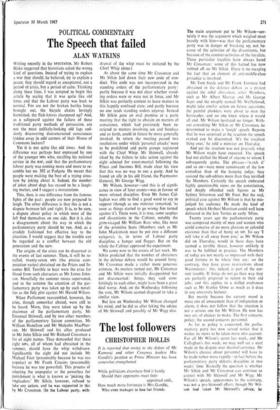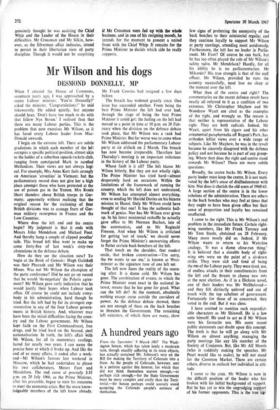The Speech that failed
POLITICAL COMMENTARY ALAN WATKINS
Writing recently in the SPECTATOR, Mr Robert Blake suggested that historians asked the wrong
kind of questions. Instead of trying to explain a war they should, he believed, try to explain a peace; they should regard as exceptional, not a period of crisis, but a period of calm. Thinking along these lines, I was tempted to begin this article by saying that it was quite like old times and that the Labour party was back to normal. For are not the broken bottles being brought out, the bicycle chains lovingly burnished, the flick-knives sharpened up? And,
as a safeguard against the failure of these
traditional party methods of persuasion, are not the most unlikely-looking old lags sud- denly discovering dust-encrusted consciences hidden away in odd corners of their House of Commons lockers?
Yet it is not quite like old times. And the difference was perhaps best expressed by one
of the younger has who, recalling his national
service in the RAF, said that the parliamentary labour party was coming more and more to re-
semble hut no. 302 at Padgate. He meant that people were making the best of a trying situa- tion by joking about it. Indeed, the number of jokes about dogs has ceased to be a laugh- ing matter, and I suggest a moratorium.
This, then, is one difference from the famous fights of the past: people are now prepared to laugh. The other difference is that this is not a dispute between left and right. It is, to be sure, a dispute about policy in which most of the left find themselves on one side. But it is also a disagreement about the way in which the parliamentary party should be run. And, as a crudely fashioned but effective key to the situation, I would suggest that the trouble can be regarded as a conflict between the old generation and the new.
The origins of the crisis can be discerned in the events of last summer. Then, it will be re- called, twenty-seven hes (the precise com- putation varies) abstained on the Prices and In- comes Bill. Terrible to hear were the cries for blood from such characters as Mr James John- son. Mercifully the summer recess supervened, and in the autumn the attention of the par- liamentary party was taken up by such novel- ties as the July plot against Mr Harold Wilson.
When Parliament reassembled, however, the cries, though somewhat abated, were still to be heard. More, they were taken up by the chairman of the parliamentary party, Mr Emanuel Shinwell, and by two other members of the parliamentary liaison committee, Mr William Hamilton and Mr Malcolm MacPher- son. Mr Shinwell and his allies produced to Mr John Silkin and Mr Richard Crossman a list of eight names. They demanded that these eight hes, all of whom had abstained in the summer, should have the whip withdrawn. Significantly the eight did not include Mr Michael Foot (presumably because he was too popular) or Mr Frank Cousins (presumably because he was too powerful). This process of selecting the unpopular or the powerless for punishment is what is known as 'picking the ringleaders.' Mr Silkin, however, refused to take. any action, and he was supported in this by Mr Crossman. (In the Labour party, with-
drawal of the whip must be initiated by the Chief Whip alone.) At about the same time Mr Crossman and Mr Silkin laid down their new code of con- duct. This code was not incorporated in the standing orders of the parliamentary party: partly because it was not clear whether stand- ing orders were or were not in force, and Mr Silkin was perfectly content to leave matters in this happily confused state; and partly because no one reads standing orders anyway. Instead Mr Silkin gave an oral promise at a party meeting that the right to abstain on matters of conscience, which had previously been re- stricted to matters involving sex and Sundays and so forth, could in future be more generally invoked. In return the meeting passed two resolutions under which 'personal attacks' were to be prohibited and party groups registered with the Chief Whip. Mr Shinwell, already irked by the failure to take action against the eight selected for court-martial following the Prices and Incomes Bill, made clear his view that this was no way to run a party. And he found an ally in his old friend, the Paymaster- General, Mr George Wigg.
Mr Wilson, however—and this is of signifi- cance in view of later events—was in favour of more relaxed discipline. Even Mr James Cal- laghan was able to find a good word to say in support (though as one minister remarked, 'as soon as things started to go wrong Jim turned against it'). There were, it is true, some sceptics and dissentients in the Cabinet, notably the grim-visaged Mr William Ross who, like most of the primitive Scots (Members such as Mr John Mackintosh must be put into a different category), is, in terms of Labour party discipline, a hanger and flogger. But on the whole the Cabinet approved the experiment.
We come now to the events of last week. Mr Silkin predicted that the number of abstainers in the defence debate would be around forty. Mr Crossman made a rather more generous estimate. As matters turned out, Mr Crossman and Mr Silkin were initially disappointed but not disconcerted: things, they said com- fortingly to each other, might have been a great deal worse. And, on the Wednesday following the vote, Mr Wilson seemed disposed to take a similar view.
But late on Wednesday Mr Wilson changed his mind, and he did so after faking the advice of Mr Shinwell and possibly of Mr Wigg also.
The main argument put to Mr Wilson--ser- thinly it was the argument which weighed most heavily with him—was that the parliamentary party was in danger of breaking up, not be- cause of the activities of the dissentients, but because of the counter-activities of the loyalists. These particular loyalists have always hated Mr Crossman: some of this hatred has now rubbed off on Mr Silkin. There is no escaping the fact that an element of anti-middle-class prejudice is involved.
Mr Tom Steele and Mr Frank Tommey had abstained in the defence debate as a protest against the rebel abstainers; other Members, such as Mr Albert Murray and Mr George Jeger and the unaptly named Mr Wel'beloved, might take similar action on future occasions; the painful plodders were about to man the barricades; and no one knew where it would all end. Mr Wilson hesitated no longer. With- out consulting Mr Silk in or Mr Crossman, he determined to make a 'tough' speech. Reports. that he was surprised at the reaction the speech evoked can be discounted. 'It's the toughest thing ever,' he told a minister on Thursday.
And yet the reaction was not precisely what Mr Wilson might have expected. The speech had not chilled the blood of anyone to whom I subsequently spoke. The phrases—'watch it' and so on—were more reminiscent of the low comedian than of the hanging judge; they assisted the sub-editors more than they terrified the Members. Certainly the speech embraced highly questionable views on the constitution, and deeply offended such figures as Mr Sydney Silverman and Mr Foot. But the real, political case against Mr Wilson is that he mis- judged his audience. He made the kind of speech which Herbert Morrison could well have delivered in the late 'forties or early 'fifties.
Twenty years ago the parliamentary party was composed mainly of men and women who could conceive of no more glorious or splendid existence than that of being an MP. To say 'I will take it all away from you,' as Mr Wilson did on Thursday, would in those days have seemed a terrible threat, however unlikely it was to be fulfilled in practice. The Members of today are not nearly so impressed with their good fortune to be where they are: on the contrary, they have grave reservations about Westminster: this, indeed, is part of the cur- rent trouble. If things do not go their way they are perfectly prepared to return to their old jobs; and this applies to a skilled craftsman such as Mr Stanley Orme as much as it does to any university lecturer.
But merely because the current mood is more one of amusement than of indignation or alarm, it does not follow that the situation is not a serious one for Mr Wilson. He now has two sets of choices to make. The first concerns policy; the second concerns personnel.
As far as policy is concerned, the parlia- mentary party has now served notice that it wishes its views to be taken more into account. For all Mr Wilson's scorn last week, and Mr Callaghan's this week, we may well see a start made in the dispute over decimal currency. Mr Wilson's choices about personnel will have to be made rather more rapidly—in fact before the parliamentary party debates discipline in two weeks' time. Basically the question is whether Mr Silkin and Mr Crossman can continue to coexist with Mr Shinwell and Mr Wigg. Mr Wilson's speech, appearances to the contrary, was not a pro-Shinwell effort; though Mr Wil- son had taken Mr Shinwell's advice, he genuinely thought he was assisting the Chief Whip and the Leader of the House in their difficulties. Mr Crossman and Mr Silkin, how- ever, as the Silverman affair indicates, intend to persist in their libertarian view of party discipline. Though it would not be surprising if Mr Crossman were fed up with the whoie business, and in one of his resigning moods, he intends for the moment to present a united front with the Chief Whip. It remains for the Prime Minister to decide which side he really supports.































 Previous page
Previous page